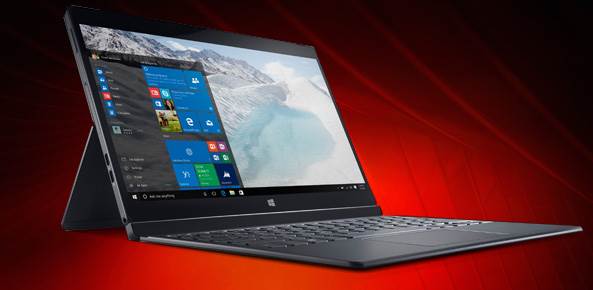Hardware maker Dell is following the lead of some of its competitors by backing away from the Android tablet platform. The company said this week that it will stop making its Android Venue tablets as well as its Wyse Cloud Connect, a thumb-size Android computer that can turn a display into a PC. Dell is also ceasing firmware updates on those devices.
Instead, the company will start to focus more on 2-in-1 portable devices, like the Latitude 12 7000 shown above, running the Microsoft Windows 10 operating system. That’s a market Dell is betting has better growth potential. The hybrid systems, sometimes called detachable tablets, offer the performance power of regular laptops with the mobility of lightweight tablets. That 2-in-1 combination has been a popular hit, so far, among business users.
Oversaturated Tablet Market
The company will still sell devices that run Android apps, however. Dell’s Chromebook 11 3120 and Chromebook 13 7310 both run the Chrome operating system and can run Android apps via the Google Play Store. But the Chromebooks won’t run the Android OS. Dell also sells XPS and Precision laptops with the Ubuntu OS to developers, along with thin clients running Linux, Windows Embedded and Wyse’s ThinOS operating systems.
“We’ve found that the lack of productivity delivered by slate tablets are forcing people to leave them at home, and instead continue to use PCs to get real work done,” Kirk Schell, Dell vice president and general manager for commercial client solutions, said in an email to reporters. “The slate tablet market is oversaturated and is experiencing declining demand from end users.”
Dell said it will still provide services and support for current Android-based Venue tablet owners until the expiration of the company’s contracts with users and the end of the devices’ warranties. The company is also in the process of selling its IT services division to Japanese company NTT Data.
Others Have Done Likewise
The market trend seems to indicate that 2-in-1 systems are becoming more popular, a trend that syncs up nicely with what Schell called Dell’s faith in the flexibility and functional design of 2-in-1 systems for commercial use.
“With the release of Windows 10, our 2-in-1s and laptops are positioned to take advantage of the largest growth opportunities within the personal computing space,” Schell said. “Dell is repositioning its mobile products portfolio to take advantage of both the resurgence of the 2-in-1 market and the continued growth of the traditional form factor laptop.”
Dell is far from the only company that has cut back on its production of tablets. HP now offers just a few Android tablets, mainly aimed at business clients. Dell is also following the lead of Lenovo, which is offering fewer Android tablets these days and has expanded its Windows-based 2-in-1 lineup.
Apple was the world’s top tablet vendor in the first quarter of 2016, followed Samsung, Amazon, Lenovo and Huawei, according to figures from the analyst firm IDC.
SKP:
Posted: 2016-07-01 @ 2:38pm PT
Great move. Get rid of that rubbish Chrome OS.






